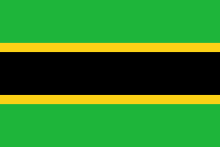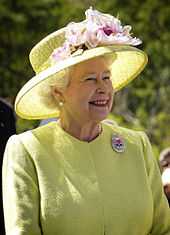Monarchies in Africa
There are presently hundreds of monarchies in Africa; that is: either actually or nominally self-governing states, territories, or nations on the continent of Africa where supreme power resides with an individual, who is recognised as the head of state.[1] All are similar in that the sovereign inherits his or her office and usually keeps it until death or abdication. However, only five are sovereign, while the remaining are sub-national monarchies. Of the former, four are constitutional monarchies, wherein the sovereign is bound by laws and customs in the exercise of his or her powers, and one is an absolute monarchy, wherein the sovereign rules without bounds; currently three of these monarchies are independent states, while the remaining two are dependencies of European monarchies. Those monarchies that are sub-national in nature are not sovereign, and exist within larger political associations.
Some current monarchies
| State | Dependency | Succession | Monarch | Reign since | Heir apparent |
|---|---|---|---|---|---|
| | Kingdom; constitutional | Elective | Letsie III | 12 November 1990 | To be determined by Senate of Lesotho when necessary |
| | Kingdom; constitutional | Agnatic primogeniture | Mohammed VI | 23 July 1999 | Moulay Hassan, Crown Prince of Morocco |
| | Kingdom; absolute | Elective | Mswati III | 25 April 1986 | Unknown |
| Territory | Dependency | Succession | Monarch | Reign since | Heir apparent |
| (Kingdom of Spain) | Autonomous community | Male-preference cognatic primogeniture | Juan Carlos | 22 November 1975 | Felipe, Prince of Asturias |
| (Kingdom of Spain) | Autonomous community | Male-preference cognatic primogeniture | Juan Carlos | 22 November 1975 | Felipe, Prince of Asturias |
| (Kingdom of Spain) | Autonomous community | Male-preference cognatic primogeniture | Juan Carlos | 22 November 1975 | Felipe, Prince of Asturias |
| (United Kingdom) | British overseas territory | Male primogeniture[N 1] | Elizabeth II | 6 February 1952 | Charles, Prince of Wales[2] |
| Nation[N 2] | Type | Succession | Monarch | Reign since | Heir apparent |
| (South Africa) | Sub-national monarchy | Cognatic primogeniture | Goodwill Zwelithini kaBhekuzulu | 17 September 1968 | Misuzulu Zulu |
| (Ghana) | Sub-national monarchy | Elective | Otumfuo Nana Osei Tutu II | 26 April 1999 | Kevin Alfah |
| Okyeman (Ghana) | Sub-national monarchy | Hereditary and Elective | Osagyefo Nana Amoatia Ofori Panin II | 4 October 1999 | Kevin Alfah |
| (Zambia) | Sub-national monarchy | Cognatic primogeniture | Lubosi Imwiko II | October 2000 | |
| (Uganda) | Sub-national monarchy | Elective | Muwenda Mutebi II | 31 July 1993 | Unknown |
| (Uganda) | Sub-national monarchy | Iguru I | 1994 | ||
| (Uganda) | Sub-national monarchy | Elective | Edward Columbus Wambuzi Zibondo XIII | 31 October 2008 | Unknown |
| (Nigeria) | Sub-national monarchy | Cognatic primogeniture | Ado Bayero | October 1963 | |
| (Angola, Democratic Republic of the Congo, and Zambia) | Sub-national monarchy | Cognatic primogeniture | Mbumb II Muteb | 1997 | |
| (Uganda) | Sub-national monarchy | Cognatic primogeniture | Rukidi IV | 5 September 1995 | TBA |
| (Uganda) | Sub-national monarchy | Cognatic primogeniture | Charles Mumbere | 2009 |
- African monarchs
-

Mswati III
King of Swaziland
Former monarchies
Pre-colonial Africa
- Iron Age empires of North Africa
- Medieval (8th to 13th century) Islamic empires (caliphates) in North Africa
- the medieval Sahelian kingdoms
- The Ethiopian Empire is notable as an empire in continuous existence from the 13th to the 20th centuries, succumbing neither to the Islamic conquests nor to European colonialism.
- empires of the "transitional period" of the 15th to 19th centuries.
- Islamic sultanates of the Sudan and the great Somali Empire (Golden Empire)
- kingdoms of West Africa succeeding the Sahelian kingdoms
- kingdoms of Central and Southern Africa such as the Kongo Kingdom and the Mutapa Empire.
- The Merina Kingdom of Madagascar.
20th century
-
 Ankole (Uganda) (abolished 1967)
Ankole (Uganda) (abolished 1967) -
.svg.png) Burundi (Kingdom of) (abolished 1966)
Burundi (Kingdom of) (abolished 1966) -
 Central African Empire (abolished 1979)
Central African Empire (abolished 1979) -
 Congo Free State (annexed by Belgium 1908)
Congo Free State (annexed by Belgium 1908) -
.svg.png) Egypt (Kingdom of) (abolished 1953)
Egypt (Kingdom of) (abolished 1953) -
.svg.png) Ethiopia (Empire of) (abolished 1975)
Ethiopia (Empire of) (abolished 1975) -
.svg.png) Libya (Kingdom of) (abolished 1969)
Libya (Kingdom of) (abolished 1969) -
 Rwanda (Kingdom of) (abolished 1961)
Rwanda (Kingdom of) (abolished 1961) -
 Tunisia (Kingdom of) (abolished 1957)
Tunisia (Kingdom of) (abolished 1957) -
.svg.png) Zanzibar (Sultanate of) (abolished 1964)
Zanzibar (Sultanate of) (abolished 1964)
Former Commonwealth realms
-
 The Gambia (abolished 1970)
The Gambia (abolished 1970) -
 Ghana (abolished 1960)
Ghana (abolished 1960) -
 Kenya (abolished 1964)
Kenya (abolished 1964) -
 Malawi (abolished 1966)
Malawi (abolished 1966) -
 Mauritius (abolished 1992)
Mauritius (abolished 1992) -
 Nigeria (abolished 1963)
Nigeria (abolished 1963) -
 Rhodesia (not recognized; abolished 1970)
Rhodesia (not recognized; abolished 1970) -
 Sierra Leone (abolished 1971)
Sierra Leone (abolished 1971) -
 South Africa (abolished 1961)
South Africa (abolished 1961) -
 Tanganyika (abolished 1962)
Tanganyika (abolished 1962) -
 Uganda (abolished 1963)
Uganda (abolished 1963)
Notes
- ↑ Absolute primogeniture is being considered.
- ↑ Nation here refers to the more strict usage of the word, meaning a body of people or a community. The monarchies in this column are all sub-national monarchies, and do not constitute sovereign states.
References
- ↑ http://twistedsifter.com/2012/07/kings-of-africa-portraits-by-daniel-laine/
- ↑ Pierce, Andrew (24 December 2005). "Call me George, suggests Charles". The Times. Retrieved 2006-08-04.


